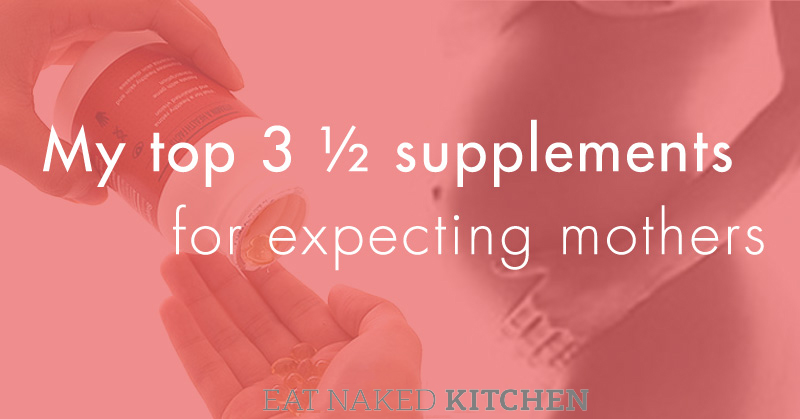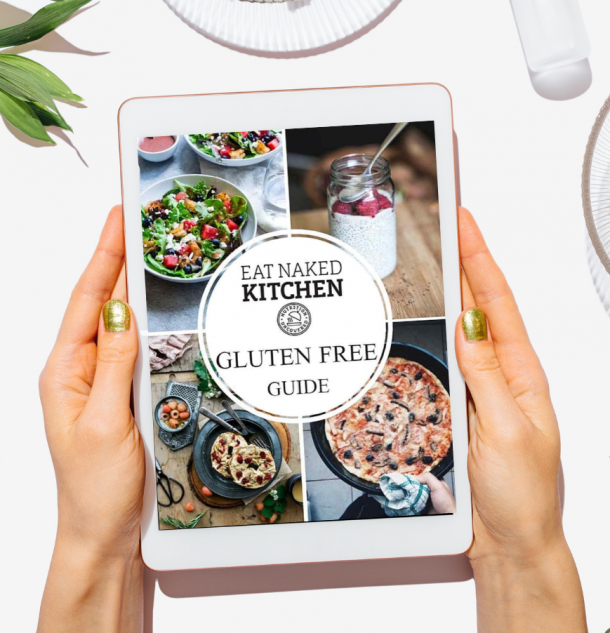Disclaimer: The information in this article is designed for educational purposes only. It is not intended to be a substitute for informed medical advice or care. Do not use this information to diagnose or treat any health problems or illnesses without consulting your health practitioner or family doctor. Please consult a doctor with any questions or concerns you might have regarding your health.
A couple of weeks ago we looked at nutrition recommendations for expecting mothers. As I shared, there’s never a more important time to pay attention to what you eat than when you’re growing a new life in your belly.
I wish I could tell you that eating well was enough. Sadly, in this day and age, it’s nearly impossible to get everything our bodies need through diet alone. Food isn’t what it used to be – even the organic, local, and seasonal stuff. Largely, this is because our soil – and thus our food, which is grown from the soil – has declined as well.
That’s a huge topic that we don’t have time to go into today. Suffice it to say, food isn’t what it used to be and so supplementing has become a necessity.
And here’s the really important part to remember when it comes to prenatal nutrition: you can’t give your baby what you don’t have. Our children inherit our nutritional deficiencies or sufficiencies. It’s that important.
Here are the top supplements I think all expecting mothers should take:
1) A quality prenatal vitamin, with folate, not folic acid.
This is your starting point. A high-quality prenatal vitamin, preferably from a professional line so you can trust the quality. Here’s the one I used (and still take daily while breastfeeding).
You are pregnant. You are building another human being. This is no small task and your body needs everything it can get in order to do this properly. I could go into long and arduous detail on the importance of every single nutrient, but I won’t at this time.
One nutrient I will call out, though, is folic acid.
Folic acid is the pregnancy vitamin if I’ve ever heard of one. You’d have to live under a rock to avoid hearing about its importance when you’re expecting. I can remember my family doctor suggesting I take it way back in high school when I started my period “just in case” (!!)
Here’s the thing about folic acid: it’s not the real deal. It’s a synthetic compound used in many dietary supplements and for food fortification. And there’s evidence that it can actually be harmful.
Folate, on the other hand, is the term given to a collection of vitamins known as B9. Folate naturally exists in food and we use it for many important functions – from DNA synthesis and energy production to the production of healthy red blood cells. It is critical for many things in addition to its role in preventing neural tube defects in newborns (the role for which it is so avidly prescribed to pregnant women). (For more on the differences between Folate and Folic Acid, read here.)
What does this have to do with your prenatal vitamins? Make sure to find a prenatal that contains folate, NOT it’s lesser-than, potentially-harmful, synthetic replica: folic acid.
2) Fermented Cod Liver Oil + High Vitamin Butter Oil
I can’t even see you and I can already feel you scrunching up your nose in disgust at this one. But bear with me. If you can’t do it for you, do it for your children…
It turns out our great grandmothers were right: cod liver oil IS good for you, nasty as it may taste. And it’s never been more important than when you’re expecting. It’s a natural, whole food source of the critical fat-soluble vitamins A and D, as well as the essential fatty acids EPA (eicosapentaenoic acid) and DHA (docasahexaenoic acid) those Omega 3s so critical to proper neurological development.
But I don’t recommend you go out there and get just any old cod liver oil. Quality is paramount here, as is how it is processed. Natural fermentation enhances vitamin D levels of the cod liver oil naturally, and the combination of that with high-vitamin butter oil, an exceptional source of vitamin K2 (a nutrient most people are deficient in that affects the development of the face and teeth) is a truly magical combination. Here’s a great article by the Weston A Price Foundation explaining more about cod liver oil and its benefits.
My favorite is Rosita Extra Virgin Cod Liver Oil, which you can get here.
3) Probiotics
Beneficial bacteria is a critical part of our digestion and immune systems. And, just like any other nutrient, our babies get their first dose of those bacteria from us. We used to believe that babies are born with sterile, bacteria-free guts, ingesting their first mouthfuls of bacteria from their mother in the birth canal on their way through during delivery. But new research indicates that they are picking up bacteria even from the womb.
Either way, our babies get their first bacteria from their mothers, and thus the health of our inner ecology directly determines that of our babies’.
And so I recommend eating a diet rich in cultured foods – cultured veggies, kombucha, kefirs, and so on – and also supplementing throughout pregnancy. Which supplement? My personal favorite is MegaSporeBiotic (available here). I do recommend rotating probiotics throughout the pregnancy so that you expose yourself to various different strains.
½) Vitamin D3
Vitamin D is a critically important for both mama and baby during pregnancy (and always) for bone development, immune health, and the nervous system. It’s also terribly difficult to get enough via the diet, and most of us don’t spend nearly enough time outdoors to synthesize sufficient quantities through our skin.
I have vitamin D as the ½ on my list because you may or may not need this supplement. For one, if you’re taking your fermented cod liver oil, you’re getting some vitamin D already, and that may be enough. The only way to know is to get your vitamin D levels checked by your physician or midwife (the test is the 25-hydroxy vitamin D – it’s a simple blood test). Optimal vitamin D levels are between 60-100 ng/dl.
I took between 2,000-4,000 ius of vitamin D3 daily in addition to my cod liver oil. I find if I don’t supplement significantly, my levels go down quickly. (And yes, I live in sunny southern California and spend a lot of time outside…) But every body is different, so you’ll need to test and determine how much, if any, you need via supplementation. My favorite vitamin D supplement is this one by Biotics.
Now, every woman is different and some of you will require targeted supplementation in addition to what I’ve listed above throughout your pregnancy. I strongly encourage you to work with a qualified natural health practitioner (Depending on your needs, you’re welcome to work with me or I have some great referrals – write me for more info) who can advise you on meeting your body’s specific needs at this most precious time.




Does an expectant mother risk vitamin A toxicity and birth defects when eating a whole foods diet AND taking a daily prenatal with 5000 IU mixed carotenoids AND a daily dose of 1/2 to 1 tsp FCLO/BO blend?
The question is about quality more so than quantity. High doses of synthetic vitamin A can certainly be toxic, but looking at ancestral diets, they would have had many times the RDA of Vitamin A during pregnancy, and prized those very organ meats so high in this vitamin that contemporary doctors warn against. What’s critical is that you be very careful about the quality and sourcing of your prenatal vitamins, and get the rest from whole foods (and FCLO/BO is actually a food, not a supplement… we just don’t think of it that way). Most diets are woe-fully lacking in this important nutrient.
Hi Margaret,
Great article, thank you for writing and sharing with us.
I took Pregnacare tablets when I was pregnant (before I knew better) which has folic acid rather than folate. A friend of mine believes that the folic acid could have caused my son’s lip tie problems and hence his tooth decay.
Any thoughts?
Many thanks and warm wishes
Zoe
I’m not sure that you can blame the folic acid for the lip tie problems, but it is good to know for any future pregnancies that you’ll want to take a prenatal with folate in it.
My wife’s carrying our first baby now and I think she’s going to like this article. I’m going to share this article to her later. Thanks a lot for sharing!